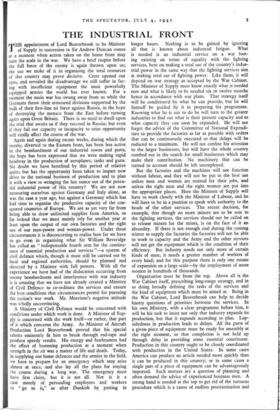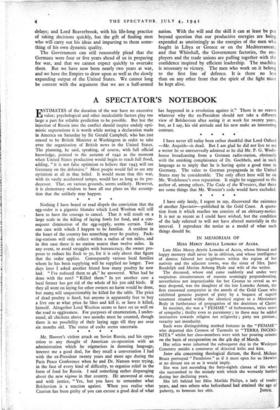THE INDUSTRIAL FRONT
THE appointment of Lord Beaverbrook to be Minister of Supply in succession to Sir Andrew Duncan comes at a moment when action taken on the home front may turn the scale in the war. We have a brief respite before the full force of the enemy is again thrown upon us; the use we make of it in organising the total resources of this country may prove decisive. Crete opened our eyes, and revealed the disadvantage we still suffer in fac- ing with insufficient equipment the most powerfully equipped armies the world has ever known. For a moment the main war has swung away from us while the Germans throw their armoured divisions supported by the bulk of their first-line air force against Russia, in the hope of destroying the menace from the East before turning again upon Great Britain. There is no need to dwell upon the trial that awaits us if they succeed in Russia; but even if they fail our capacity or incapacity to seize opportunity will vitally affect the course of the war.
Again and again during recent weeks, during which the enemy, diverted w the Eastern front, has been less active in the bombardment of our industrial towns and ports, the hope has been expressed that we were making rapid headway in the production of aeroplanes, tanks and guns. No doubt we have benefited by this period of relative quiet; but has the opportunity been taken to impart new drive to the national business of production and to plan it with a view to wringing the last ounce out of the poten- tial industrial power of this country? We are not now measuring ourselves against Germany and Italy alone, as was the case a year ago, but against a Germany which has had time to organise the productive capacity of the con- quered countries of Europe. We are as yet very far from being able to draw unlimited supplies from America, so far indeed that we must mainly rely for another year at least upon the output of our own factories and the right use of our man-power and woman-power. Under these circumstances it is disconcerting to realise how far we have to go even in organising what Sir William Beveridge has called an " indispensable fourth arm for the continu- ance of essential production and services "—a system of civil defence which, though it must still be carried out by local and regional authorities, should be planned and directed by a Minister with full powers. With all the experience we have had of the dislocation occurring from enemy bombardment and interference with war industry it is amazing that we have not already created a Ministry of Civil Defence to co-ordinate the services and ensure the best conditions that circumstances permit for pursuing the nation's war work. Mr. Morrison's negative attitude was wholly unconvincing.
A Ministry of Civil Defence would be concerned with conditions under which work is done. A Minister of Sup- ply is concerned with the work itself—or rather, that part of it which concerns the Army. As Minister of Aircraft Production Lord Beaverbrook proved that his, special talents eminently fit him to break through red-tape and produce speedy results. His energy and fearlessness had the effect of hastening production at a moment when strength in the air was a matter of life and death. Today, in supplying our home defences and the armies in the field, we have to prepare for an emergency which may arise almost at once, and also lay all the plans for staying the course during a long war. The emergency must have first claim, but it is not all. Nor is it a case merely of persuading employers and workers to " go to it," as after Dunkirk by putting in longer hours. Nothing is to be gained by ignoring all that is known about industrial fatigue. What is needed is an industrial service on a war foot- ing existing on terms of equality with the fighting services, bent on making a total use of the country's indus- trial power in the same way that the fighting services aim at making total use of fighting power. Like them, it will depend on war strategy as accepted by the War Cabinet. The Minister of Supply must know exactly what is needed now and what is likely to be needed six or twelve months hence in accordance with war plans. That strategy itself will be conditioned by what he can provide, but he will himself be guided by it in preparing his programme. Knowing what he is out to do he will turn to the greater industries to find out what is their present capacity and to what capacity they can soon be expanded. He will not forget the advice of the Committee of National Expendi- ture to provide the factories as far as possible with orders that can be continuously executed so that delays will be reduced to a minimum. He will not confine his attention to the larger businesses, but will have the whole country combed out in the search for small businesses which may make their contribution. No machinery that can be turned to account should be left unemployed.
But the factories and the machines will not function without labour, and they will not be put to the best use unless men and women are trained for their jobs, and unless the right men and the right women are put into the appropriate places. Here the Minister of Supply will have to work closely with the Minister of Labour, and he will have to be in a position to speak with authority to the heads of the other services. The recent decision, for example, that though no more miners are to be sent to the fighting services, the services should not be called on to release miners for the mines, is on the face of it an absurdity. If there is not enough coal during the coming winter to supply the factories the factories will not be able to work to capacity and the Army and the other services will not get the equipment which is the condition of their efficiency. But industry needs not only more of certain kinds of men; it needs a greater number of workers of every kind; and for this purpose there is only one means of expansion on a large scale—by the employment of more women in hundreds of thousands.
Organisation must be from the top. Above all is the War Cabinet itself, prescribing long-range strategy, and in so doing broadly defining the tasks of the services and the kind of equipment which must be aimed at. Being in the War Cabinet, Lord Beaverbrook can help to decide knotty questions of priorities between the services. In his own Ministry, with a .clear programme before him, it will be his task to insist not only that industry expands its production, but that it expands according to plan. Lop- sidedness in production leads to delays. All the parts of a given piece of equipment must be ready for assembly at the right moment, so that completion is not held up through delay in providing some essential constituent. Production in this country ought to be closely coordinated with production in the United States. In some cases America can produce an article needed more quickly than it can be produced in this country; or in some cases a single part of a piece of equipment can be advantageously imported. Such matters are a question of planning and often demand the advice of experienced business men. A strong hand is needed at the top to get rid of the tortuous procedure which is a cause of endless procrastination and delays; and Lord Beaverbrook, with his life-long practice of taking decisions quickly, has the gift of finding men who will carry out his ideas and imparting to them some- thing of his own dynamic quality.
The Government can still reasonably plead that the Germans were four or five years ahead of us in preparing for war, and that we cannot expect quickly to overtake them. But we have now been nearly two years at war, and we have the Empire to draw upon as well as the slowly expanding output of the United States. We cannot long be content with the argument that we are a half-armed nation. With the will and the skill it can at least be put beyond question that our productive energies are being expended as unstintingly as the energies of the men who fought in Libya or Greece or on the Mediterranean; and that Whitehall, the Government factories, the em- ployers and the trade unions are pulling together with the confidence inspired by efficient leadership. The machine is necessary to victory. The men who work on it belong to the first line of defence. It is there no less than on any other front that the spirit of the fight must be kept alive.































 Previous page
Previous page